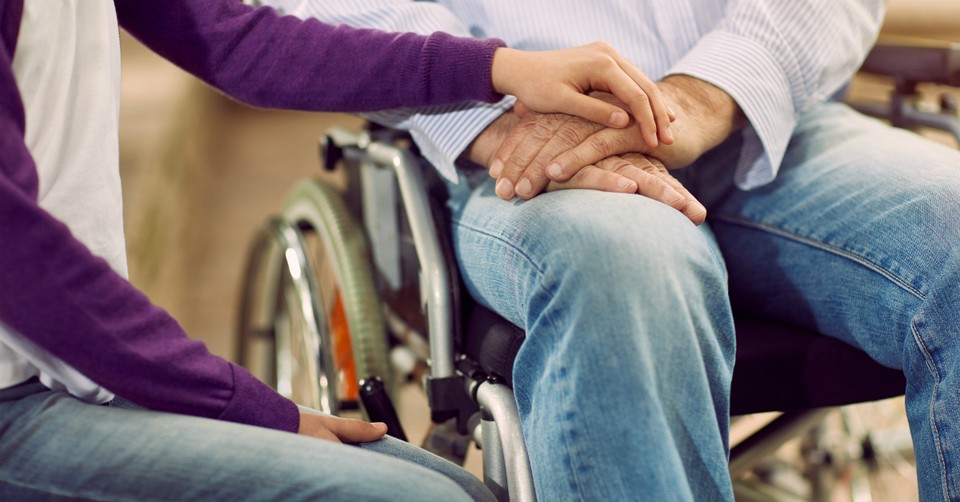Does the Bible Talk about Disabilities?

The Bible is full of people with disabilities, both physical and mental. However, God works in and through all of us, regardless of any disabilities we may have. So, what does the Bible say about disabilities?
Does the Bible Ever Mention Disabilities?
Moses wasn’t good with words and may have stuttered (Exodus 4:10-12). But God assured him He would be with him and guide him on how to speak to the people.
The pool of Bethesda in Jerusalem was usually full of people with disabilities trying to be healed by the waters there (John 5:1-3). There were blind people, lame people, and paralyzed people hoping for a chance to be well again. This was the place where Jesus found a man who had been sick and unable to walk for 38 years (John 5:5-8). Jesus healed the man with a simple command, and the man picked up his mat and walked away. Sometimes disabilities come so that God can be glorified in the healing of that disability.
People who were lame, blind, or crippled came to Jesus for help, and He healed them all (Matthew 15:30). The Lord often opened the eyes of the blind and lifted those who were weighed down with burdens (Psalm 146:8). It amazed crowds to see Jesus at work when He caused the mute to speak, the crippled and lame to walk, and the blind to see (Matthew 15:31). And sometimes, the ultimate disability was healed when dead people rose to life again (Matthew 11:5). Healings are unnecessary for the Good News of the Lord to be preached, but in a lot of these instances, the hope of the healings added to the joy of the Lord.
Yes, Jesus cares about our disabilities and will either heal them or use them as a way to work through us.
Is There a Purpose to Disabilities?
God also brings good out of disabilities by bringing people alongside to help them. Seeing a disability in another is an opportunity to help a neighbor who may feel weak. After Jonathan was killed in battle, King David found his son, Mephibosheth, who was crippled in both feet and took him into his home (2 Samuel 9). By helping people with disabilities, you can be a blind man’s eyes or a lame man’s feet (Job 29:15).
Disabilities and weaknesses also help us be dependent on God. When we feel able to do something on our own, we forget we need God, and we fall into our own independence. Feeling like we can live life on our own terms leaves us in a similar place to the prodigal son. It probably won’t end well. But staying close to the Father will cover our weaknesses.
The Apostle Paul had some kind of disability that he called a thorn in his flesh that tormented him (2 Corinthians 12:7-10). He begged the Lord to take that thorn away from him. But God simply told him, “My grace is all you need. My power works best in weakness”. When Paul realized this, he actually boasted about his weaknesses because he knew that God’s power could shine through them. Our weaknesses are an opportunity to see God’s strength.
Disabilities can be a source of strength. Jesus and his disciples came across another man who was born blind (John 9:1-3). His disciples wondered why disabilities like this happened. Why were people born with disabilities? Was it because of his own sin or his parent's sins? Jesus replied that neither of those options was true. The man had been born with a disability so that the power of God could be seen in him. Jesus then spit on some dirt and rubbed the salve onto the man’s eyes. When the man washed in the Pool of Siloam, he could see. Being healed of a disability can glorify God.
But what if a disability is not healed? Can that bring glory to God as well? Take the current life example of Joni Eareckson Tada, who became a quadriplegic at seventeen after a diving accident. After the accident, she begged the Lord to heal her. She prayed. Her family prayed. Her friends prayed. Today, in her seventies, she is still in a wheelchair. But despite her disability, she has used it to do incredible things. She created a non-profit organization, Joni & Friends, that has helped people with disabilities for over forty years. Joni’s hardship has brought hope to many people around the world with similar disabilities. Her organization helps many people with their physical needs and shares the hope of the Gospel with those same people. The answers to our physical needs are important, but our spiritual needs far surpass those temporary problems.
God uses disabilities to teach us things, mainly that He is bigger than our disabilities. And His power can work despite them. He also displays disabilities as a way of building compassion for our neighbor. Helping others with their problems helps us to forget about our own problems.
5 Things We Can Learn about Disabilities (or How We View Them) from the Bible
1. When you find yourself fretting over a disability or weakness, remember that the things we suffer in now are nothing compared to the glory that we will see later if our soul is set on the things above (Romans 8:18).
2. Disabilities, problems, and trials in this life help us develop endurance, character, and a great hope for the future (Romans 5:3-4). We learn from the things we have difficulty walking through.
3. We invite our friends and families to dinners and parties. Although there is nothing wrong with this, the Bible says that there is something even better. We should also invite the poor, the crippled, the lame, and the blind to our celebrations. The more we do to help and honor those who cannot pay us back, the more God Himself will repay us (Luke 14:12-14).
4. Always remember that God’s grace is all we really need. And His power works best when we admit our weaknesses (2 Corinthians 12:9).
5. It is better to have a physical disability and see God’s truth and glory than to be spiritually blind, thinking you are fine on your own. God wants people who will lean on Him, not people who want to live independently of Him. We need God, and disabilities help us see that.
Conclusion
Jesus has overcome all our disabilities. He loves us just as we are. Even if you have a disability, God made you long ago in your mother’s womb. You are wonderfully made and have a purpose in life (Psalm 139:13-14). We all have disabilities. None of us are perfect. We all need God to cover and help us through our disabilities.
For our present troubles are small and won’t last very long. Yet they produce for us a glory that vastly outweighs them and will last forever! So we don’t look at the troubles we can see now; rather, we fix our gaze on things that cannot be seen. For the things we see now will soon be gone, but the things we cannot see will last forever. - 2 Corinthians 4:17-18 NLT
Photo Credit: ©GettyImages/LuckyBusiness

Originally published November 22, 2022.




